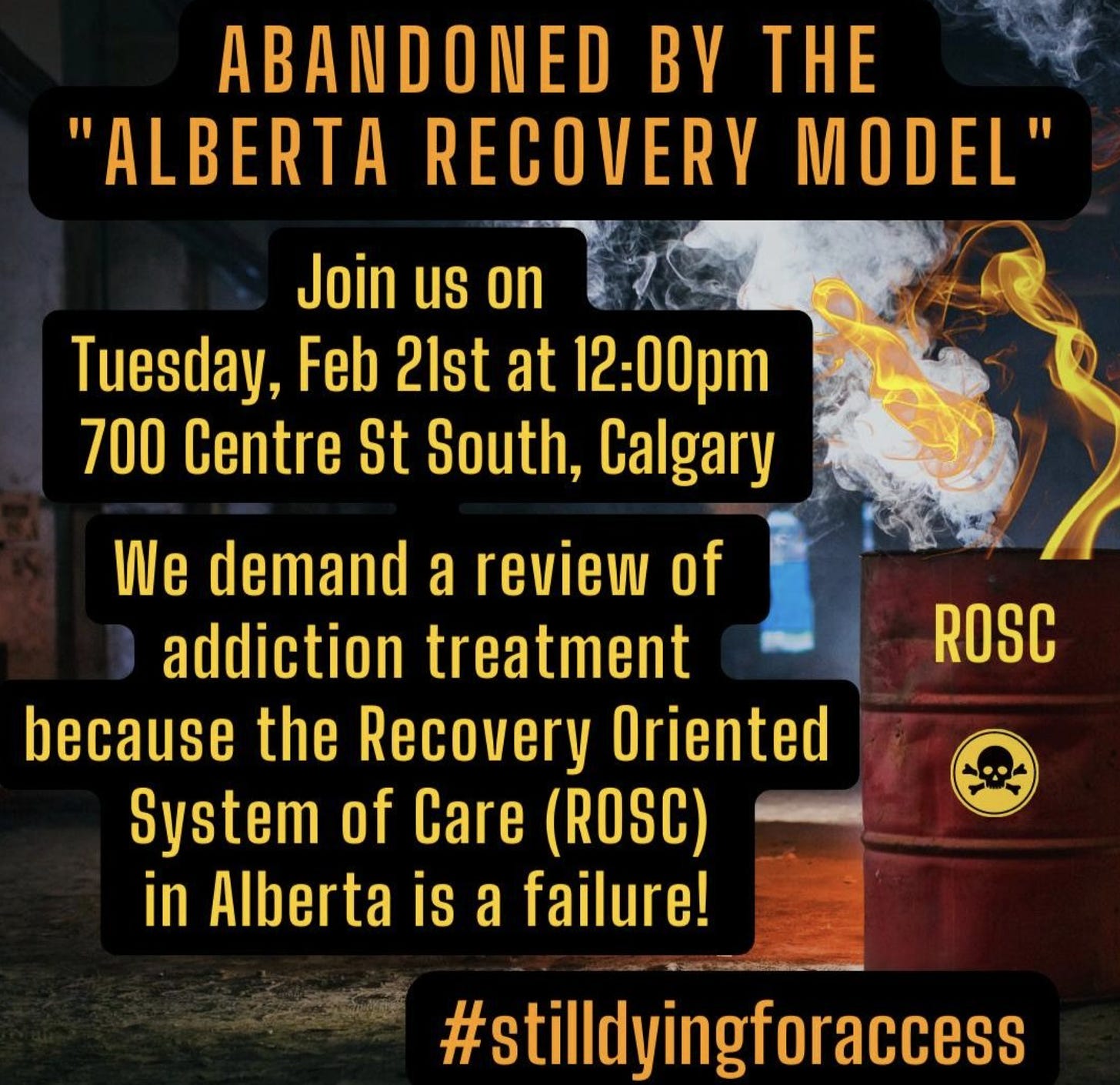Abandoned by the Alberta Model - For Immediate Release
Press Release for the protest planned outside the Alberta Recovery Conference.
This document was created with a number of people who use drugs and allies in Alberta and BC. To minimize adverse impacts, the only additional author to be named at this moment is Petra Schultz, co-founder of Moms Stop the Harm.
Anyone interested in joining the protest on Tuesday, February 21 can RSVP or join us at noon sharp outdoors at 700 Centre St S, Calgary. More information on why we are protesting can be found here.
For Immediate Release: Abandoned by the Alberta Model
Albertans who use drugs and their allies will protest the Alberta Recovery Conference at 12:00 PM MST on February 21, 2023 at 700 Centre St S, Calgary.
Satellite event in Edmonton at noon at the Health Services Corporate Office, Seventh Street Plaza, 10030 – 107 Street NW.
Coinciding with the Alberta Recovery Conference organized and sponsored by Last Door Recovery Society, this rally is a demand for oversight of the unregulated addiction treatment industry with visible ties to far-right nationalism, allegations of sexual misconduct, questionable sole-source contracts and a persistent refusal to provide measures of success.
Harm reduction and recovery are inextricably linked, because dead people do not recover. The terms “recovery” and “treatment” have been ripped from their foundations in autonomy and individualism, distorting their definitions contrary to evidence. These falsifications wrongly justify the institutionalization of both practices. To rectify this intentional misrepresentation, these definitions must be addressed. “Recovery” is a non-linear, socially constructed practice, and success is contingent on an individual’s goals related to drug use. “Treatment” is an evidence-based medical practice that insists on verifiable, objective medical outcomes, evaluation, accountability and voluntary consent.
We support these definitions of recovery and treatment in concept and practice. We support meeting people where they are at regarding their relationship with drugs, understanding that recovery can include resuming use after a period of abstinence. The unregulated drug supply poisons people indiscriminately, inhibiting recovery efforts by punishing all use including “relapse” with poisoning and death. We support reducing harms for all people who use drugs.
The ongoing provincial public safety task forces for Calgary and Edmonton augment unaccountable policing of poverty with the implied aim of forcing unhoused people into addiction treatment. Involuntary treatment repeats colonial harms, runs counter to evidence and represents a legal breach of basic human rights.
Because the UCP government has invested hundreds of millions in private and for-profit treatment without reporting or accountability, it is wrong to conflate “The Alberta Model” with recovery or treatment. Paired with expanded police powers, the model is more accurately described as incarceration.
We urge the UCP government to rescind this plan immediately.
Evidence-based treatment is under threat. The Narcotic Transition Services program separates patients from their wellness achieved through trusted providers and medications. The program was criticized by 20 organizations in an open letter to the UCP government. The letter states that “Imposing such a policy will push people living stable lives back into the toxic unregulated drug supply. People will die because of this policy.”
Other UCP measures that threaten and cost lives are the closure and cancellation of supervised consumption sites in Lethbridge, Edmonton, Medicine Hat and Calgary, with additional closures pending in Red Deer and Calgary. In every location where sites have been closed, drug poisoning deaths have dramatically increased. We fail to see how this strengthens businesses or communities.
The UCP government routinely compares the Alberta model to its BC counterpart, but fails to mention that Alberta has 1,300 ‘treatment’ beds versus 3,260 in British Columbia. Neither province holds these programs accountable to their outputs. In June, 2022, we issued an open letter detailing 50 missing evaluation criteria from Alberta’s abstinence-oriented approach, including length of treatment wait lists, deaths during and following treatment programs, indications of culturally safe options and trauma-informed care, and aftercare facilitated and tracked by these programs, such as housing.
Meanwhile, the UCP and AHS provide millions in sole-source contracts with unclear outputs and no accountability. Among these is a $1,227,000 contract to Last Door Recovery to implement My Recovery Plan. We also have yet to see evaluation data for the Digital Overdose Response Service (DORS), which received $1,084,500 in sole-source contracts.
We call for regulation of recovery programs and reinvestment in harm reduction.
To address the ongoing crisis, we call on the Government of Alberta to:
Rescind the Narcotic Transition Services (NTS) program and restore the legal mandate of physicians and nurse practitioners to set prescribing guidelines.
Replace the NTS with evidence-informed access to regulated substances in models co-designed with people who use drugs.
Expand supervised consumption services, including those promised in Edmonton and Calgary, and reactivate closed and cancelled sites.
Provide a comprehensive oversight plan of policing in Alberta as it relates to addiction treatment, accompanied by a statement affirming that no person in Alberta will be coerced into treatment, including as a precondition to housing.
Provide data on the effectiveness and safety of treatment programs regarding access, regulation, critical incidents and performance evaluation.
Unregulated drug poisoning is the leading cause of preventable death in Alberta. Lack of accountability for addiction treatment and barriers to evidence-based services will ensure this continues.





